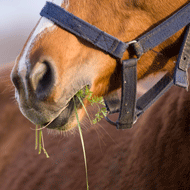
Diet and exercise programme key to compliance
With encouragement from their vet, owners of overweight ponies can help to reduce the serious risks caused by obesity, according to a new study.
Research published in the Equine Veterinary Journal (EVJ) has revealed that owners of ponies with equine metabolic syndrome can, with help from their vet, implement highly effective weight loss programmes, which in turn improves insulin sensitivity and reduces the risk of laminitis.
Equine metabolic syndrome shares traits with type II diabetes in humans and is characterised in horses and ponies by obesity, insulin resistance and an increased susceptibility to laminitis.
In the study, vets at the Universities of Liverpool and Edinburgh examined nineteen horses and ponies with suspected EMS and/or a history of laminitis.
Each horse underwent clinical examinations and endocrine testing. Owners were then given individual diet and exercise plans to follow for between three and six months. They were also given daily support from vets throughout the period.
Following the treatment, the tests were repeated and the results compared to the initial assessment. All but one horse showed a significant reduction in weight, accompanying reductions in insulin levels and therefore reduced susceptibility to laminitis.
Project co-ordinator Ruth Morgan from the University of Edinburgh said: "Our weight loss work shows that if owners are educated, informed and encouraged by their vets they can effectively induce weight loss and improve insulin resistance. We found that the key to compliance is the individual tailoring of a weight loss programme for each horse."
Celia Marr, editor of the EVJ added: "We know that most owners are keen to do the best for their horses, but sometimes they lack the knowledge of facilities to implement a weight loss programme easily.
"The study has shown how consistent, responsive support from a vet, coupled with innovative individual methods for weight loss, can make all the difference."
The study is discussed in a free EVJ podcast, which is aimed at helping vets to help their clients.



 The Federation of Independent Veterinary Practices (FIVP) has announced a third season of its podcast, Practice Matters.
The Federation of Independent Veterinary Practices (FIVP) has announced a third season of its podcast, Practice Matters.